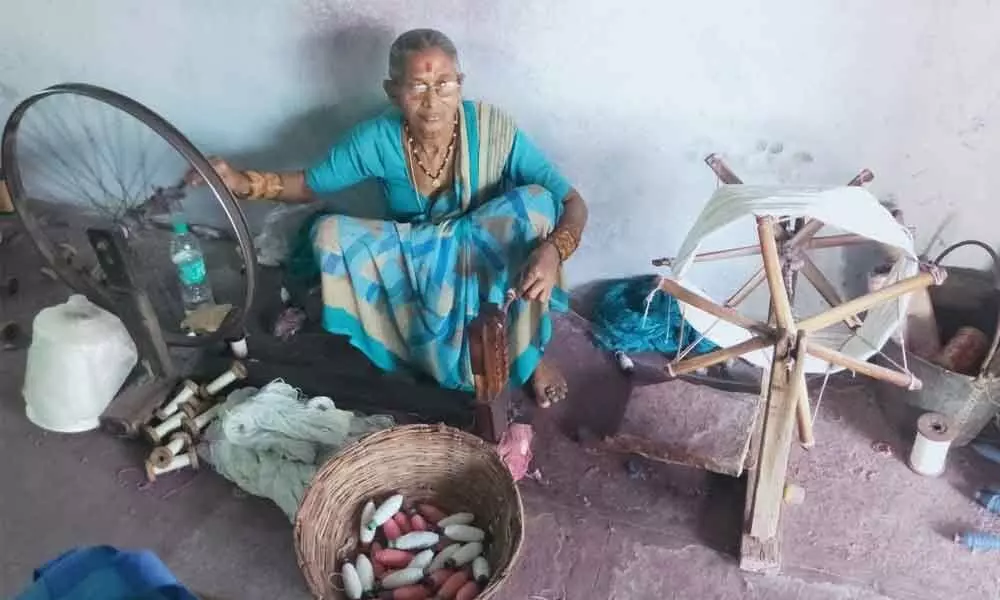Weavers in doldrums: Spikes in spinning wheels

An old woman spinning the yarn on a spindle at Kamalapur in Hanumakonda district on Tuesday
Notwithstanding the claims of the government, weavers continue to mire in poverty. A peep into the lives of weavers who have been working with the Kamalapur Handloom Weavers Cooperative Society (KHWCS) for decades give an account of misery they were under.
Kamalapur (Hanumakonda): Notwithstanding the claims of the government, weavers continue to mire in poverty. A peep into the lives of weavers who have been working with the Kamalapur Handloom Weavers Cooperative Society (KHWCS) for decades give an account of misery they were under. What all that a weaver gets is a paltry Rs 7,000 after a month-long toil. And it's even more discouraging to see a woman who works on a spinning wheel (charkha) to make yarn spindles to earn just Rs 2,000 a month.
Even though the handloom weavers have stepped up the range of their products, including denim fabric used for jeans, to catch the imagination of the youth, the fate written on their forehead is unwilling to change. Talking to The Hans India, Jadala Sudhakar, who traditionally weaves chaddars, said, "It's difficult to lead life with the kind of wages we are getting. It's been four years since there was a hike in our wages." A few years ago, there was a hike in labour charges, but it was restricted to those weavers who produce terry cotton (TC).
Thanks to the Rajiv Vidya Mission which procures terry cotton from weavers and supplies to children.
The weavers who produce chaddars, towels, bedsheets, lungis, kerchief, nawar, nets and dhotis continue to work with old wages that hardly make their ends meet. These weavers at an average get Rs 300 to Rs 400 a day in 24 working days of a month.
A source from the handloom cooperative society said that TSCO stopped yarn supply to the handloom societies in 2018. Since then the societies were procuring yarn on their own. Even though the TSCO was giving a 40 per cent subsidy on the cost of yarn, it hardly benefits the societies due to a hike in yarn prices that escalated to Rs 351 per kg from Rs 271 per kg. Despite a hike in the yarn prices, the TSCO has been counting Rs 271 per kg which is a loss to the societies. It's learnt that the TSCO was making delayed payments to the societies.
In a spiral effect, it was affecting the weavers also.
Sabbani Sunitha who turns a wooden spinning wheel said, "We hardly get Rs 100 a day. But we have no option left to eke out a livelihood." It may be mentioned here that the majority of the weavers still working are above the age of 60 years.
Our lives are entwined with weaving and it's difficult to change our profession. Although the government was doing its bit to protect the handloom industry, its future is bleak as the younger generations are unwilling to take up our caste-based profession, another weaver Udutha Rajaiah said.

















